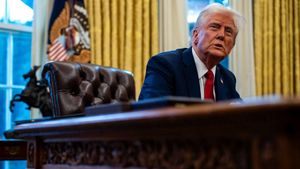Canadian officials are expressing significant concern over newly imposed tariffs by President Donald Trump, labeling the move as perplexing and disappointing. These tariffs, announced over the weekend, include a hefty 25% on imports from Canada and Mexico, along with 10% on goods from China. This decision, according to White House sources, is aimed at curtailing illegal immigration and the influx of fentanyl, criticisms of which have been vocalized by Trump himself.
During an appearance on ABC's "This Week," Canadian Ambassador to the U.S. Kirsten Hillman spoke candidly about the reactions from Canadians. She stated, "Canadians are perplexed, I think disappointed. We view ourselves as your neighbor, your closest friend, your ally..." Hillman's comments underline the deep historical connections and mutual trust between the two neighboring countries. She remarked on Canadians’ confusion, emphasizing their long-standing partnership evidenced by shared military sacrifices and collaborative efforts such as disaster response, highlighting occasions when Canadians came to the aid during significant crises like the Los Angeles fires.
Hillman conveyed her hope for negotiations to prevail before the tariffs become effective on Tuesday. "We’re hopeful they don't come to effect on Tuesday. We're ready to continue to talk to the Trump administration about our reciprocal interests and the various work we're doing with them to manage border concerns," she shared.
Prime Minister Justin Trudeau's government did not linger long before announcing their own set of tariffs—25% on approximately $155 billion CAD (around $107 billion USD) worth of U.S. goods—a strong retaliatory measure indicating how serious Canada characterizes the situation.
Hillman confirmed the existing discussions with senior White House officials, even though there hadn't been recent direct talk between Trudeau and Trump. "Not recently, but they have communicated previously and have laid out plans for addressing the president's demands" she mentioned. This, she felt, showcased Canada’s commitment to address U.S. security concerns responsibly.
Looking to address the emotions surrounding these tariffs, Hillman acknowledged the hurt and confusion Canadians are experiencing. She emphasized, "I think they know the degree to which we have made every effort to address the president’s concerns, and so they just don’t understand where this is coming from, and probably there's a little bit of hurt, right?" Her sentiments echo widespread sentiments of betrayal, as the actions taken by Trump are perceived as detrimental to the historically amicable U.S.-Canada relationship.
Back at the White House, Trump defended his actions resolutely on social media, asserting these tariffs are necessary to mitigate what he termed the decades-long "RIPOFF OF AMERICA" at the hands of countries like Canada and Mexico. He described the tariffs as pivotal steps toward making America great again, declaring, “This will be the Golden Age of America!”
While Hillman reiterated Canada’s commitment to fair discussions and the avoidance of escalation, her messaging was firmly centered on Canadians’ expectations for their government to defend its interests vigorously: "The Canadian people are going to expect our government stands firm and stands up for itself... I don’t think we are at all interested in escalation, but there will be strong demands on our government to uphold our agreements with the U.S."
Reflecting on the strong economic ties, Hillman outlined the realities of daily exchanges between the two nations, with hundreds of thousands traversing the border for various reasons, including work and commerce. "We have 400,000 to 500,000 people moving across our borders daily. There’s this strong sense of partnership, of family, underscored by being each other’s best customer. This situation creates sentiments of misunderstanding, which is hard for Canadians to grasp," she explained.
Trump's administration continues to hold firm on their stance, invoking the administration's narrative around drug trafficking as influencing factors for punitive tariffs. White House Press Secretary Karoline Leavitt supported this, stating, "The president will be implementing tariffs due to illegal fentanyl sourced from Mexico and Canada, which has resulted in mass fatalities among Americans. These are promises made and promises kept."
Therefore, as tensions between the two neighboring nations escalate, so does the anticipation of how these tariffs will reshape not just trading relationships, but also underlying sentiments of betrayal and confusion among Canadians. The situation encapsulates how economic policies resonate far beyond borders, stirring emotions and challenging long-standing relationships.



